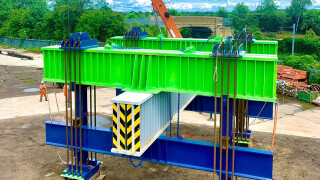Van Elle floats raft idea to house-builders
Ground engineering specialist Van Elle is hoping to interest house-builders with a new piled raft foundation system that it calls Smartdeck.
Smartdeck integrates piling and foundations to floor slab level and complements the company’s established Smartfoot precast foundation beam system.
Van Elle said that discussions were ongoing with customers and it hopes to start deploying Smartdeck on projects in 2024.
Despite the slow-down in the house-building sector, Van Elle is looking to Smartdeck to help drive its own growth. It is also exploring the possibility of Smartdeck being used to create safety refuge areas along the UK’s so-called ‘smart’ motorways.
In January 2022, the government paused new all-lane-running motorway projects pending a review. However, the 10-year National Highways Smart Motorway Programme Alliance is trying to make existing ‘smart’ motorways a bit safer by putting in emergency areas that were originally specified in the initial schemes but cut from later schemes for cost reasons.
As a national framework partner to the Alliance, Van Elle expects to participate in the delivery of the retrofit work starting next year.
A third strand of Van Elle’s growth strategy is Canada. It has incorporated Van Elle Canada Inc ahead of major rail infrastructure and electrification opportunities expected in Ontario.
In a trading statement issued in April, AIM-listed Van Elle Holdings plc said that its full year results for the year to 30th April 2023 would be in line with expectations, with group revenues 20% up on the previous year.
But with industry forecasts indicating that weaker market conditions will continue into the new financial year, particularly in the new-build housing sector, Van Elle is also taking actions to cut costs.
Firm footings for new road bridge
Eric Wright Civil Engineering has started main construction work on a £7.4m replacement road bridge over the river Clyde in South Lanarkshire following completion of piling works by specialist foundations contractor Aarsleff.
The Clyde bridge on Pettinain Road in Carstairs was closed in 2018 after a routine inspection found structural defects. South Lanarkshire Council awarded Eric Wright Civil Engineering a £7.4m contract last November to put in a replacement.
Specialist foundations contractor Aarsleff has now completed installation of all 64 pre-cast concrete piles for the new bridge substructure.
Mabey Bridge has been appointed by Eric Wright to manufacture and install the main bridge superstructure which will span 90 metres across the Clyde, near Carstairs Junction, 30 miles southeast of Glasgow.
The 90-metre single span will be launched across the river from one side rather than being lifted into position. The new bridge will sit on the piled reinforced concrete abutments to provide maximum stability and improved load-bearing.
The existing bridge was built in 1912 and was an early example of reinforced concrete bridge construction in Scotland. However, a three-tonne weight limit was imposed for a number of years and it was finally closed to traffic in August 2018.
Once the new bridge is completed the old bridge will be demolished and removed from site.
“This bridge has been in desperate need of replacement for many years,” said Eric Wright Civil Engineering managing director Diane Bourne, “and we are delighted to have been appointed and to mark the start of delivering this much-needed local infrastructure which will benefit the community for decades to come.
“The project will include a 4.2-metre-wide carriageway and an additional footway as well as bringing in new approach roads to the north and the south which will tie into C29 Pettanain Road. Our team has extensive experience in delivering key infrastructure projects such as this, including the Pooley Bridge replacement in Cumbria.”
South Lanarkshire Council’s head of road and transport services, Colin Park, said: “This will reinstate an important part of our road network and see the end of the current diversion route, which can add significant time and miles onto journeys, for road users.”

RSK companies collaborate on major ground investigations
Ground investigation specialist Structural Soils is embarking on what it claims is the UK’s largest ground investigation project to date.
The project, part of a major National Highways infrastructure contract, started in early March and is programmed to last 22 weeks. It involves contributions from 14 other companies which, like Structural Soils, are part of the RSK Group.
The team will contribute to a project that includes eight schemes designed to improve the A66 trunk road between M6 junction 40 at Penrith to A1(M) Scotch Corner. If approved by the secretary of state, the work will involve dualling the remaining single carriageway sections and improving junctions.

Structural Soils managing director Stephen Mackereth said: “I was fortunate enough to be able to visit the A66 site recently and I was able to gain an appreciation of the magnitude of the job we are doing, which is really quite something, even by the standards we have previously set ourselves.
“We are principal contractor for a project that entails something in the order of 1,300 exploratory holes, many now requiring the services of both cable percussion and rotary rigs to complete them. We have 17 drilling crews and four trial-pitting crews on site and some four kilometres of drilling is required.
“We have put more than 200 people through the National Highways online induction process to enable them to work on the site and the site team is supported by a back-room staff of administrators, reporting engineers and lab technicians,” continued Mackereth. “It is safe to say this is our biggest challenge to date by quite some way and we are working hand-in-hand with 14 RSK businesses to deliver this.”
The other group companies involved are RSK SafeGround and Centara, both providing service clearance, RSK Consents Solutions facilitating access to the exploratory holes, Acies Group contributing temporary works design, EDP providing health and safety support, traffic management from Streetwise UK Management, archaeological services from Headland Archaeology, ecological services from ADAS, Envirolab carrying out chemical testing and CAN providing plant and equipment.
JB Site Investigations, Dynamic Sampling UK and PB Drilling are carrying out the drilling work and Drilling Supplies UK is providing the drilling consumables.
High capacity test rig for large piles
Piling specialist Cementation Skanska says that its new high-capacity maintained load test system adds significant capability in pile load testing.
The new MLT60 system is capable of testing up to 60MN (6,000 tonnes), which makes it the UK’s highest-capacity load test system, according to the company.
Typically, the maximum capacity limit for pile test rigs is around 30MN, although Cementation claims that it currently holds the record for the largest ever test carried out in the UK – 50.5MN – using a bespoke piece of single-use equipment.
Depending on the size of load test needed, the MLT60 can be used with differently-sized test beams up to a maximum of 60MN.
The design means that it can be assembled, dismantled and transported easily for use anywhere.
Cementation Skanska says that as piles have got bigger and deeper it has become much harder to test to failure. The extra capacity of the MLT60 means that foundations can be tested to much higher loads – ideal for major infrastructure and large scale, high-rise commercial and residential projects.
The company employed 3D computer modelling, trial builds and digital ‘rehearsals’ during the design process to ensure that the test rig would be stable and safe. It has produced a full set of temporary-works designs covering every part of the system’s safety and stability during assembly and dismantling.
Cementation Skanska says the new high-capacity test rig reduces the number of assumptions that need to be made about the performance of materials under high loads. It means contractors can validate assumptions and rationalise scope and designs using the extra data obtained.
Got a story? Email news@theconstructionindex.co.uk




